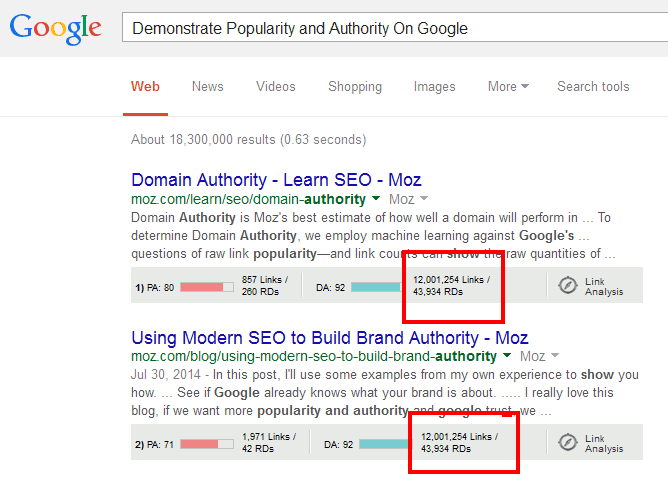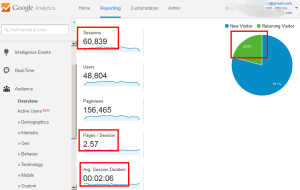Estimated Read Time: 5 Minutes
Google Earns Ad Revenue From Search
Google earned more than $146.92 billion in ad revenue in 2020. Advertisers bid to have sales copy for their products or services displayed prominently at the top or bottom of relevant search result pages.
Ad revenue is Google’s primary source of income. It is imperative they do not compromise that revenue stream by delivering unpopular, inaccurate, incomplete, or unhelpful search results.
Google Ranks Deserving Content on Top
For your website and page content to rank above all others, you have to give Google evidence that your content has earned the privilege of ranking on top, that it deserves to rank highly because past visitors to the site have demonstrated evidence of having appreciated it.
When Google is deciding which web pages to rank at the top of search results, it doesn’t just look for relevant results (results that contain the words you’re searching for and satisfy your search intent), it also looks for results that exhibit evidence of having previously satisfied visitors who came to the site.
It’s very similar to what we all do, consciously or unconsciously when deciding on a restaurant or coffee shop. We pick the one that’s most crowded assuming popularity translates into better service and higher quality. We don’t line up to get into the empty shop on the corner. We go to the brightly lit, crowded one (like the one shown above) a few doors down from that.

Empty coffee shop image compliments of Travis Swicegood on Flickr.
It’s All Theory
Before I attempt to explain how Google determines popularity and authority, let me first say that there isn’t an SEO on the planet that knows with certainty how Google measures popularity, authority or anything else for that matter.
Google’s ranking algorithm is a proprietary secret. The company doesn’t want to give away its competitive advantage. Nor does it want anyone to be able to game the system. That would impede the quality of its results.
SEOs, for the most part, aren’t trying to game the system either. We know Google is an integral part of many people’s lives. We all rely on Google to find the information we want and need, quickly and reliably.
Some SEOs make a living researching patents and testing hypotheses about how Google works. The goal is to understand Google’s ranking algorithm so we can help our customers compete fairly and effectively, without jeopardizing search result quality. Those hypotheses are the basis for what I’ll explain next.
How Google Measures Popularity
Google measures popularity by keeping track of how many and which other websites and web pages link to and cite your content. These things signal credibility and usefulness to Google. The presumption is, the more your content is referenced or recommended to others, the more valuable it is.

In the snapshot above I’ve shown the top two search results for the search query “demonstrate popularity and authority on Google”. The grey shaded bar beneath each result is a browser plugin that allows me to see how many incoming links each site has. You can see that the top result has 12,001,254 incoming links from 43,934 root domains. That’s a whole lot of links coming from a whole lot of different sources and likely influences this result ranking on top.
Same with the second result, although, in this example, both results are from the same website so incoming link and root domain counts are identical. The count is of links to the site and not the page. Otherwise, they would be different.
Links Are Not the Only Measure of Popularity
Google also keeps track of how many people visit your site and spend time on each page. It can tell if a visitor left your site immediately after arrival (bounced). It can tell if a visitor viewed multiple pages, how much time he or she spent on each page, and whether they were a first-time or repeat visitor.

You can view your own site engagement statistics by installing the Google Analytics tool. It’s available free to anyone with a Google account. The image above is an example of Google Analytics data showing sessions (visits to the site), pages per session (2.57), and average session duration (02:06).
Incoming links, root domains, visits, page views, average time on site – all these metrics weigh in on the assessment of a site’s popularity, or lack of popularity, to Google. The more visits, links, page views, time-on-site and repeat visitors you earn, the more popular your content is going to be perceived and the higher it will rank.
That is a controversial statement. Not everyone agrees that Google uses these metrics when deciding who to rank where. I am suggesting that whether these exact metrics are used or not is not what’s important. It is important that you recognize you need to create content that people value. How exactly Google measures that can be debated ad nauseam.
How Google Measures Authority
Authority derives from who links to you. Not all links are created equal. Ones coming from high-ranking, well-trafficked, and popular websites are worth more than others, the thought being they are pickier about who they want to cite and reference.
The more powerful the source of the link, the greater its value and impact on your rankings.
Examples of authoritative websites include Google, Facebook, Youtube, Yahoo, Baidu, Wikipedia, Amazon, Reddit, Tumblr, Huffington Post, Bank of America, Web MD, and the IRS. Alexa publishes its own curated list of the top 500 sites on the Web.
That same plugin I showed you earlier also reports domain (website) authority. Domain authority is a measure of a website’s relative power and a predictor of its ranking ability. Domain authority is reported as a number between 0 and 100, with 100 being the highest. (Google has a domain authority of 100.)

If we revisit search results for “demonstrate popularity and authority on Google”, you can see that the site that ranked #1 and 2 for “demonstrate popularity and authority on Google” (moz.com) is very powerful, clocking in with a domain authority of 92.
Demonstrating Popularity and Authority on Google Isn’t Enough
One last caveat. Demonstrating popularity and authority on Google isn’t enough to get you ranked at the top of search results. You also have to be eligible to rank – meaning you first have to get found and indexed by Google, then you have to be relevant.
Hopefully, this makes a bit of sense. If it doesn’t, ask a question below and I’ll get back to you.
IMAGE CREDIT: Full (popular) coffee shop compliments of Wayne Lee (originally posted to Flickr as IMG_0305) [CC BY-SA 2.0], $146.92 billion in ad revenue in 2020







Leave A Comment